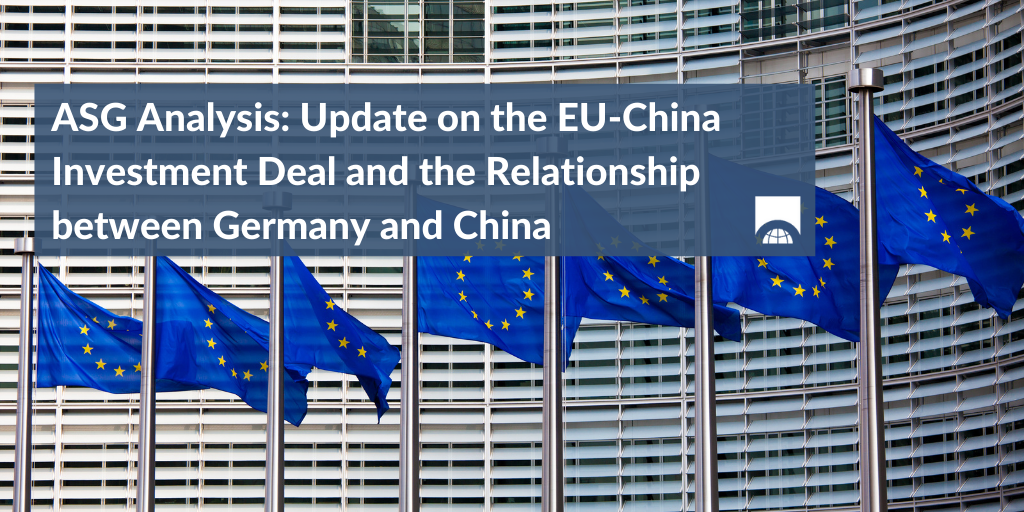ASG Analysis: Update on the EU-China Investment Deal and the Relationship between China and Germany

Key Takeaways
-
On January 22, the European Commission released the full text of the EU-China Comprehensive Agreement on Investment (CAI). The preamble underscores commitments to “building their economic relationship based on openness, reciprocity and mutual benefit."
-
WirtschaftsWoche, a German business magazine, reported an alleged side deal between Germany and China concerning rights for Deutsche Telekom (DT) and China Mobile. In return for Germany’s support of the CAI, DT would receive a mobile phone license to operate in China and possibly rights to build its own infrastructure in China within five years. This would make DT the first foreign company to receive a mobile phone license in China. China Mobile might also receive access to Germany.
-
The alleged DT-China Mobile side understanding seems complex and possibly illusory, a carrot extended just out of reach until the agreement is adopted, and German government officials and DT have denied the story. However, inquiries about side understandings will be central to consideration of the deal in the European Parliament. While Germany pushed for the CAI during its final days of the EU presidency, other member states have criticized the agreement’s lack of legally binding commitments and disregard for human rights concerns in China. Ultimately, the CAI is not a “done deal” until member states give their approval, which is far from clear.
-
The WirtschaftsWoche report also references China’s ambition to become a global player in aircraft construction. Airbus has operated a plant in Tianjin since 2009, and China hopes its state-owned Commercial Aircraft Corporation of China (Comac) can become more involved in production to supply more components and compete with Airbus and Boeing on the global stage.
-
Like in previous dealings with Europe, China has sought to make deals one country at a time, giving it enormous leverage in negotiations. This strategy focuses on dividing Europe to make advantageous agreements with individual member states—such as in the case of the reported side understanding with Germany during CAI negotiations. Part of President Biden’s foreign policy strategy will be to assemble countries together into a multilateral coalition able to negotiate from a position of strength. If this works, the CAI, and the possible side dealings, may be one of the last gasps of China’s country-by-country approach.
-
While not discussed in the CAI, the battery and electric vehicle industries are also influential in the relationship between China and Germany, Europe’s industrial hub. Given the EU’s pledge to be climate neutral by 2050, as outlined in the European Green Deal, sustainable mobility will be a top priority in Europe. China has pledged to be climate neutral by 2060 so it, too, is incentivized to step up cross-border electric mobility cooperation. Svolt Energy Technology, a subsidiary of China’s Great Wall Motor Co., plans to produce battery cells directly in Europe. The company has a start production date of 2023 from its new gigafactory in Saarland, Germany.
-
For more on the EU-China CAI, read our recent ASG Analysis.
______________________________________________________________________________________
About ASG
Albright Stonebridge Group (ASG) is the premier global strategy and commercial diplomacy firm. We help clients understand and successfully navigate the intersection of public, private, and social sectors in international markets. ASG’s worldwide team has served clients in more than 120 countries.
ASG's Europe Practice has extensive experience helping clients navigate markets across Europe & Eurasia. For questions or to arrange a follow-up conversation please contact John Hughes.
